Saturday, August 16, 2008, 14:22 - Commentary
BrooklynFor those of you counting it is just two weeks until I head to France! I am as excited as you are to get back to shooting but there is a LOT to do between now and then. So I will get back to it but enjoy your HCB Quote of the Week!
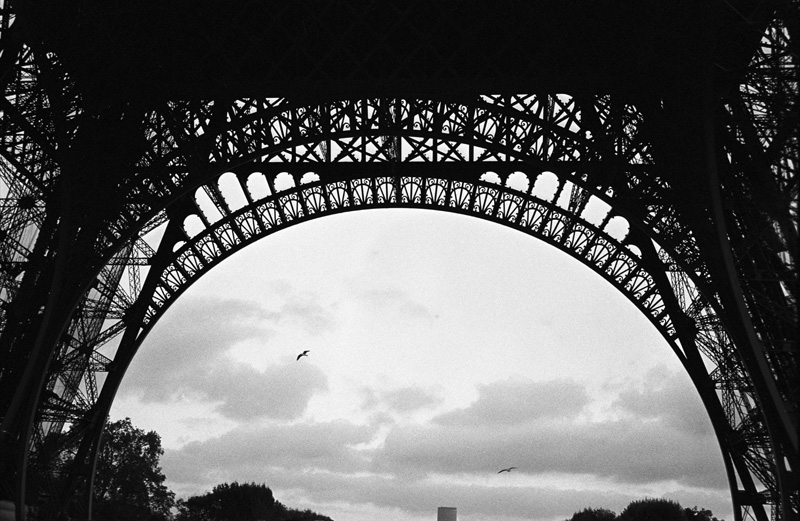
Structure and form. Paris 2007 © Damaso Reyes
The picture is good or not from the moment it was caught in the camera. - Henri Cartier-Bresson
| 0 trackbacks
| 



 ( 3 / 1744 )
( 3 / 1744 )




 ( 3 / 1744 )
( 3 / 1744 )
Friday, August 15, 2008, 11:22 - Commentary, Photo of the Day
BrooklynIf you have time check out this super interesting article about a scientist who has developed a genetic map of Europe.

“The genetic map of Europe bears a clear structural similarity to the geographic map. The major genetic differences are between populations of the north and south (the vertical axis of the map shows north-south differences, the horizontal axis those of east-west). The area assigned to each population reflects the amount of genetic variation in it.”
What I find interesting about this is that a map like this could be a thing of the past in another few generations as more and more Europeans move about the Union and marry each other and intermingle those so called “pure” bloodlines.
What about you? Are you of mixed heritage? Where do you fall on this map?
Thursday, August 14, 2008, 15:14 - Commentary, Photo of the Day
BrooklynOnce again those rebels at The Guardian are writing about drug reform in the United Kingdom, more specifically about the need for it.
“I joined the unit more or less agnostic on drugs policy, being personally opposed to drug use, but open-minded about the best way to deal with the problem," he wrote on the blog. "I was certainly not inclined to decriminalise. However, during my time in the unit, as I saw more and more evidence of 'what works', to quote New Labour's mantra of the time, it became apparent to me that ... enforcement and supply-side interventions were largely pointless. They have no significant, lasting impact on the availability, affordability or use of drugs," said Julian Critchley, the former director of the Cabinet Office's anti-drugs unit.

Give the people what they want? © Damaso Reyes
Several nations in Europe, most notably The Netherlands, have largely decriminalized the use of so called soft drugs like pot and even harder drugs like cocaine. What seems clear is the “war on Drugs” as we call it in America has failed. Prices have gone down and usage has gone up. Just like during Prohibition people find a way of doing what they want, even if it is illegal. The question is how much time and money should society spend trying to stop them?
Wednesday, August 13, 2008, 11:55 - Commentary, Photo of the Day
BrooklynKeeping with our economic focus this week, we learn from the New York Times about the economic slowdown that is gripping the United Kingdom. It seems like more than a few dodgy mortgages were sold there as well and home prices are falling while inflation and unemployment are edging up.

Where’s my rising tide? London 2005 © Damaso Reyes
As much as we like to think that E.U. economic policy is harmonized in reality it is not. Member states have a great deal of freedom and some even regularly violate the stability pact meant to keep budget deficits in line. Many critics have said that individual nations need the free to react to individual national economic situations but in this day and age, where we are globally connected, especially within the Union how true does that statement remain?
Tuesday, August 12, 2008, 15:00 - Commentary, Photo of the Day
BrooklynJust like in America, much of Europe, especially Western Europe, is getting old. Of all the issues this demographic push brings up, none is more fought over than pensions. While many Americans my age don’t really believe that Social Security will be there for them to fall back on when they retire, the generous benefits that exist in Europe are a sacred cow.
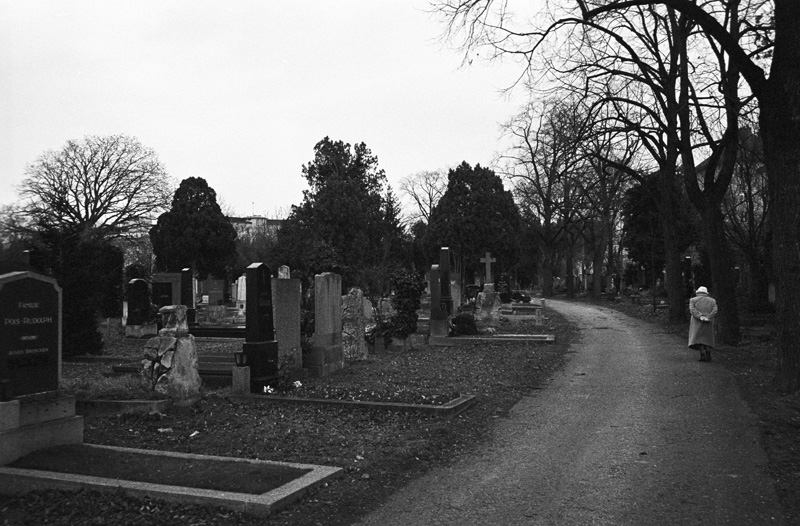
The slow decline. Vienna 2008 © Damaso Reyes
But as we read in an article in the New York Times, more and more European nations are moving to overhaul their pension systems even raising the retirement age. Clearly this important issue will continue to dog European voters and politicians and the number of retirees continues to grow over the next few decades and fewer and fewer young people replace them in the workforce.
Monday, August 11, 2008, 14:26 - Commentary, Photo of the Day
BrooklynAs many of you already know, a small scale war of sorts has been going on over the past few days between Russia and Georgia over the breakaway enclave of South Ossetia. It started when Georgia increased military operations to try to reclaim the province which has insisted on independence for the better part of the decade. Moscow, always interested in keeping its former satellites weak, has encouraged this even as it has brutally fought its own separatists in Chechnya.
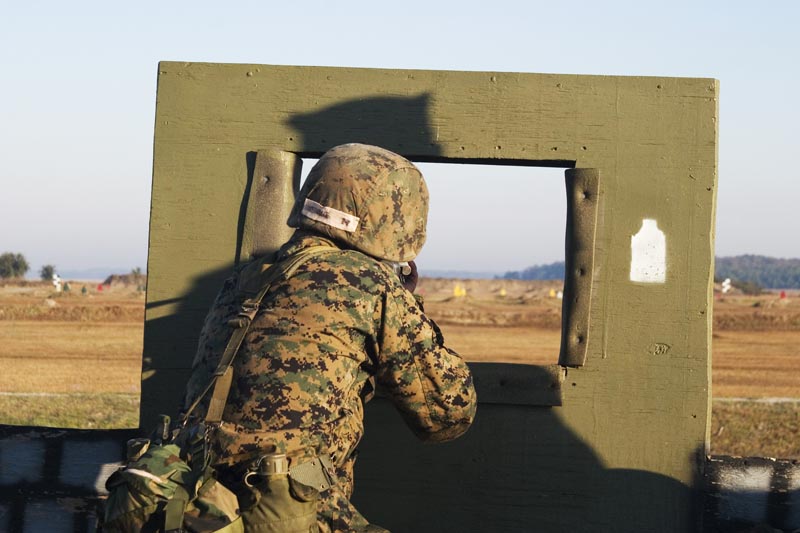
A sign of things to come? © Damaso Reyes
So what does all this mean? Well the interesting question many Georgians have asked as Russian forces bomb their capital is “where is the United States and the European Union?”
Ten years ago Russia was in a shambles in all senses: economically, politically and militarily. The strong hand of Vladimir Putin and rises prices for oil and natural gas has given Moscow power again. One reason why you don’t hear more than strongly worded statements coming from Europe is the Russia is one of the largest suppliers of natural gas to the European Union. This of course puts E.U. member states in a bit of a pickle: if they get in Moscow’s way they may find their shipments of gas inexplicably detoured, as the Ukraine discovered several times in the past few years.
It seems like the conflict in Georgia is winding down since Moscow has made its point, showing their smaller neighbor who is the tough guy in the region. But for those who fear the Russian bear this most recent conflict is a bad omen…
Saturday, August 9, 2008, 07:04 - Commentary
BrooklynFor those of you in New York, I will be presenting a slideshow of images from The Europeans today at 4:30 at The Spark, which is located at 161 West 22nd Street (6th & 7th Ave).
If you can’t come don’t worry, I plan on doing a few events this fall upon my return. In the meantime enjoy your HCB Quote of the Week!
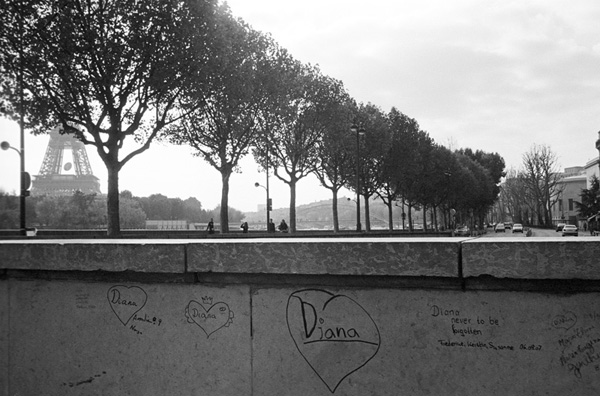
The handwriting on the wall. Paris 2007 © Damaso Reyes
Drawing with its graphology, elaborates what our consciousness grasps in an instant. - Henri Cartier-Bresson
Friday, August 8, 2008, 12:59 - Commentary, Photo of the Day
BrooklynIf we read a recent article in the EU Observer we can see what happens when nearly the nearly thirty member state of the European Union can’t coordinate their foreign policy.
“Twenty EU states will begin welcoming Kosovo passport holders after Pristina started issuing the new documents on Wednesday (30 July). Slovakia will not allow entry however, while the six other EU countries that do not recognize Kosovo have not made their position clear.”
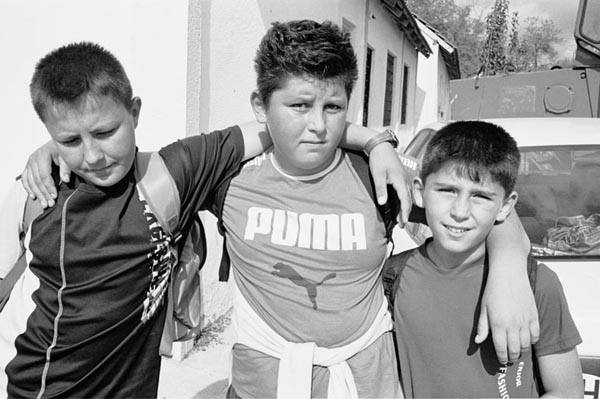
Can we has passports? Kosovo 2005 © Damaso Reyes
Countries including Spain, Greece and Portugal have not recognized Kosovo as an independent nation. The problem of course is that most countries in the E.U. are members of the borderless Schengen treaty zone which allows for free travel. So someone can legally enter Germany with their Kosovo passport but they can’t go to Spain even though there is no border control.
The issue of Kosovo is a prime example of why the E.U. needs a coherent foreign policy and the dangers of one. Nations like Spain with its Basque separatists don’t want to recognize Kosovo because they don’t want their own people getting any fancy ideas. At the same time it is clearly untenable that most of the E.U. recognizes Kosovo and a few don’t. I imagine at some point soon all the E.U. will have formal relations with Kosovo.
Thursday, August 7, 2008, 13:51 - Commentary, Photo of the Day
BrooklynSince immigration is one of the core themes of my project it makes sense that we talk about it quite a bit. I think it is hard to underestimate the transformative effect that a borderless Europe is having. An article in Der Spiegel talks about how many Eastern Europeans are now choosing to stay home rather than go abroad. The torpid state of the economy in many western countries is a part of it but the fact that many nations in the E.U. are so hostile to immigrants is surely another.
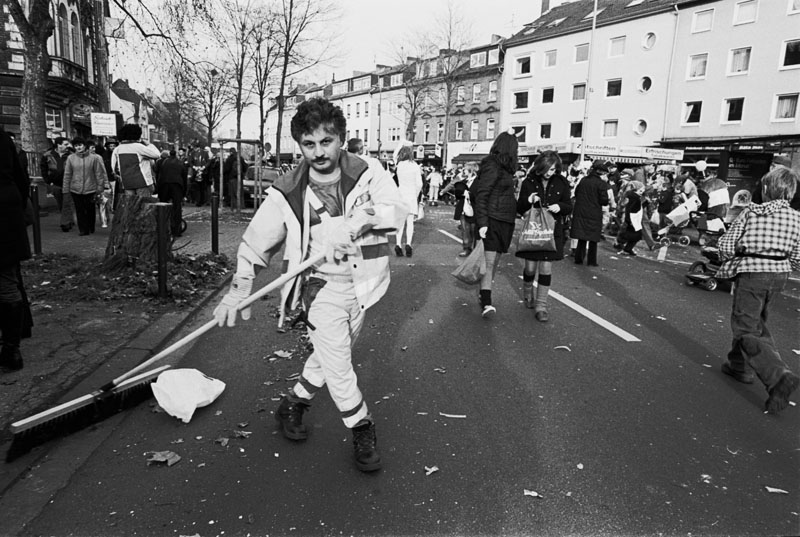
Me and my friends are leaving, goodbye! Cologne 2007 © Damaso Reyes
“Now, though, the debate may be changing. Indeed, should the economic downturn prove short-lived the UK and other Western European countries may eventually be wondering how they can attract more workers from the east. The outflow of laborers from countries like Poland may already be reversing.
“According to recent survey conducted by the Public Opinion Research Center (CBOS) in Warsaw, only half as many Poles are willing to work abroad as in 2004. Furthermore, UK government statistics indicate that the numbers of work permits issued to Eastern European immigrants dropped by 10 percent in 2007 against 2006. In the first quarter of this year, the number of permit applicants under the UK's Worker Registration Scheme -- which was set up in 2004 to regulate the inflow of workers from the new member states -- was the lowest it has been since the first quarter of 2005.”
Clearly this will have a negative impact on western economies. As much as foreigners are often maligned and blamed for the ills of society their cheap labor helps keep those same economies afloat. How long will it be before these same nations are begging for immigrant labor?
Wednesday, August 6, 2008, 11:07 - Commentary, Photo of the Day
BrooklynWe’ve been kinda down on the state of the discussion surrounding immigration in Europe lately but lo and behold there is actually a positive piece in the Guardian! The author interviewed twelve children who had recently immigrated to the U.K. and asked about their experiences. What’s nice about this piece is that we actually hear the voices of the immigrants, something very rare in the mainstream media.
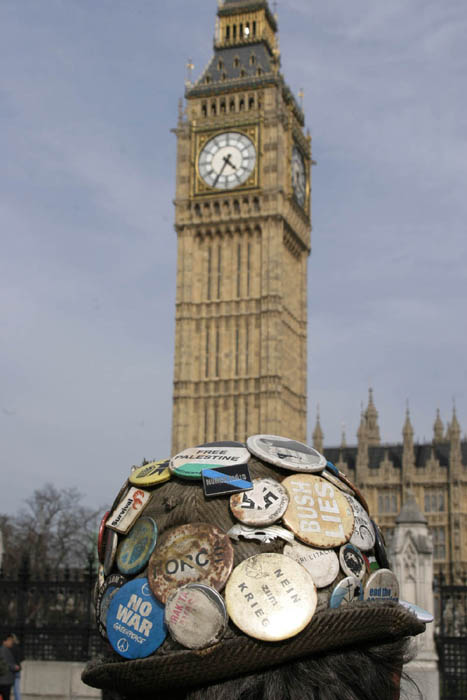
Speaking truth to power! © Damaso Reyes
It’s a great piece and I encourage you all to check out the full text but here is one part:
Oliwia, 13, moved from her two-bedroom flat in Slupsk, Poland, in 2006 with her mother, who was looking for work. They now rent a room in Harrow, northwest London. Her mother works as a cleaner and studies English at college. Oliwia goes to school in Hounslow.
How did you find out you were moving to the UK?
My auntie was living in England and when she came back to visit us my mum said, just for a joke, that we would move there too. Then my mum thought about it seriously. She showed me our tickets and I opened my eyes and I was like: 'It's my dream come true.'
Why did you move?
In Poland they don't want that many people to work if they're quite old. Over here you can do whatever work you like. My mum doesn't speak English well so she's a cleaner now, but she's learning English so she can look for other work. She'd like to work in a shop.
What happened the day you left?
Grandma and grandpa took us to the airport. I had a diary and my mum wrote me a message saying that on this day our lives would change completely. It was really nice but quite sad.
What was your old home like?
I lived in a flat at the top and I had my own room. It was about 20km to the beach. In the summer holidays we'd go to the seaside.
How was your first day at school?
My first day was scary. I didn't speak English well so I didn't understand a lot, but it was fun.
What are the other children like?
In Poland you only have people from Poland but here you have people from all different countries. Some people are racist; I tell them to stop or I just ignore them.
What do you like most about living here?
Fast food. It's really cheap but it's so tasty.
What do you miss most about home?
My grandma and my grandpa. I used to spend all of my summer holidays with them.
Where will you live when you grow up?
Maybe somewhere really hot but maybe not, because then there's a lot of spiders, so I think this is the best country because it's quite warm.
Tuesday, August 5, 2008, 13:56 - Commentary, Photo of the Day
BrooklynToday we look toward Italy and the issue of immigration. We’ve talked about demographics before but it bears repeating the Western Europe need immigrants and lots of them. But many nations are very resistant to what they see as the endless flood of immigrants which threatens to overwhelm them and with paragraphs like this one from an article in the IHT it is no wonder.
“About 800 illegal immigrants landed in Southern Italy on Thursday, with emergency services warning that already crowded holding centers were near collapse in a country that had declared an immigration emergency.”
Without a deep and far reaching discussion about the benefits and costs of immigration an atmosphere of intolerance can prevail leading to a paragraph in today’s second article found in Der Spegiel.
“Authored by Thomas Hammarberg of the Council of Europe -- a human rights watchdog not connected to the European Union -- the report dished up searing criticism of Italy for its treatment of the Roma and Sinti minority population as well as its highly restrictive immigration policies. In particular, Hammarberg lambasted Italy for using "security concerns" to justify its actions.”
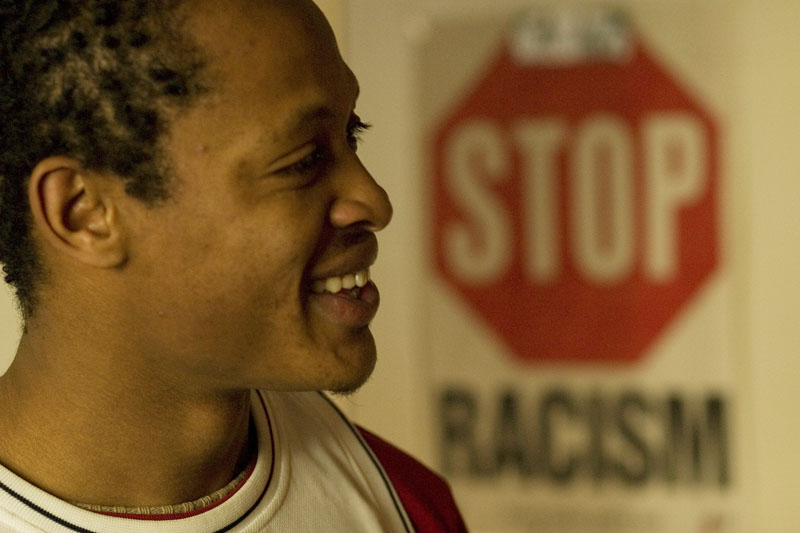
Just another Austrian. © Damaso Reyes
The question of course is what is to be done? How should Europe be handling its immigration? Perhaps more importantly how can Europe integrate those who come to it seeking a better life? To me it is a question of seeing immigrants with new eyes. At some point Europeans have to accept that immigrants are part of their society and not outsiders who somehow don’t belong. That has to be the first step. There are examples of plenty of societies which can successfully integrate their immigrant populations but clearly more work needs to be done…
Monday, August 4, 2008, 11:40 - Commentary, Photo of the Day
BrooklynAs most of you know, the newspaper, not to mention magazine business, is in serious trouble. Papers are laying off stay (including photographers) and cutting the number of editorial pages they run. Throughout my career I have noticed a decline in the number of opportunities and jobs I have been able to find. An interesting article in the Columbia Journalism Review talks about the trends.
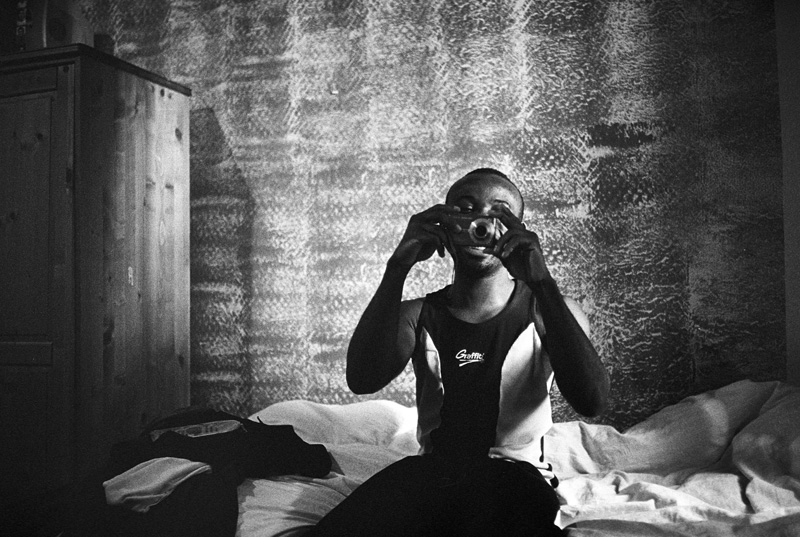
My competition. Vienna 2008© Damaso Reyes
“Photographic storytellers are competing with the millions-strong army of amateur photographers whose work is housed on Flickr, which editors cull for cheap or free images, and the rise of amateur-supplied agencies, including iStockphoto—owned by the largest stock agency of them all, Getty Images. There are also outlets that claim to separate the digital wheat from the chaff, like PhotoShelter, a “global stock marketplace,” or the jpg Magazine, which threshes out a few hundred images submitted by Web amateurs and publishes them on paper. As Magnum photographer Chris Anderson glumly puts it, he and other professionals are ‘watching the decline of editorial sales of images, both what we are assigned to produce and the buying of editorial images—and I am waiting for that moment when that decline drops straight off a cliff.’”
Clearly there is a need for professional photographers and amateurs can’t replace the training and dedication we have (it’s the same reason bloggers can’t replace investigative journalists). To report on the most important and least covered events around the world takes patience and dedication, something someone on their holiday usually doesn’t have.
Now this doesn’t mean that the economic environment will continue to support our activities. I do believe that a time will come very soon when things do “fall off a cliff.” In twenty years the (much diminished) ranks of photojournalists may very well consist of the Top 1% who actually get paid assignments from whatever is left of the mainstream media and “trustafarians” who can pay their own way. The idea that someone who grea up poor like I did can become a successful international photojournalist may very well not exist by the time I have children, whenever that day comes.
I need a drink!
Saturday, August 2, 2008, 14:46 - Commentary
BrooklynOne month form now I will be in France, woo hoo! I know you are just as excited as I am for me to be back out in the field. Of course there is lots to do between now and then so I will leave you with your HCB Quote of the Week!
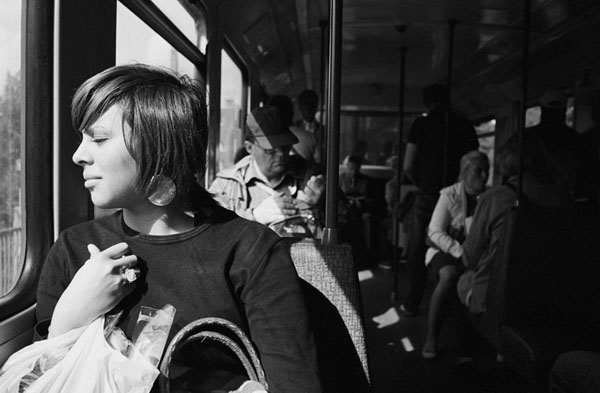
Silence is golden! Berlin 2007 © Damaso Reyes
In a portrait, I’m looking for the silence in somebody. - Henri Cartier-Bresson
Friday, August 1, 2008, 13:19 - Commentary, Photo of the Day
Brooklyn“In a very real sense, 2009, not 1992, truly will be the ‘hour of Europe.’ By that I mean that if the chancellor of Germany, the prime minister of Britain and the president of France -- backed by their counterparts in Southern Europe, Eastern Europe and Scandinavia -- were to walk into the White House on Jan. 21 and propose serious, realistic new contributions to, say, the war in Afghanistan, the reconstruction of Iraq, the nuclear negotiations with Iran and perhaps even climate change, the White House would listen,” so writes Anne Applebaum in the Washington Post.
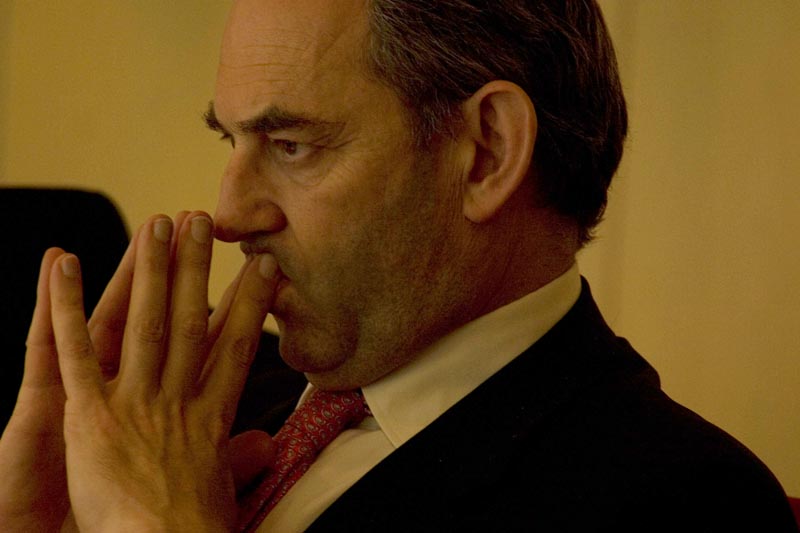
Thinking in The Hague… © Damaso Reyes
One of the main rationales for the European Union is to serve as a counterweight to the United States but while Europe has done a great job at coming together economically it has done a pretty dismal one of doing so on the political level, especially when it comes to foreign affairs (see the Iraq War).
But the new generation of European leadership including Merkel, Sarkozy and Brown seem to be interested in finding a way of working together rather than pursuing their individual national interests.
The question is can they see the forest for the trees?
Thursday, July 31, 2008, 14:07 - Commentary, Photo of the Day
BrooklynSo it seems like at least one European leader is taking my advice and pushing for a more democratic process when it comes to the future of the European Union. Spiegel reports on France’s move to allow its citizens to directly vote on future E.U. enlargement and other matters of import.
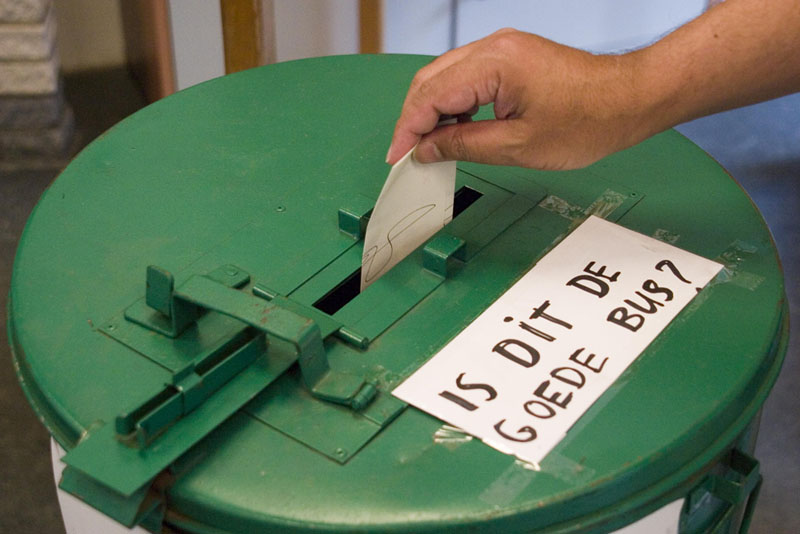
Is this the right box? No one knows for sure… Amsterdam 2005 © Damaso Reyes
This of course is a good thing even though E.U. voters have rejected a constitution the three times they had a chance to vote for it. This change will hopefully mean that European leaders and those interested in a more closely integrated Europe will actually try to engage their public and convince them that a healthy E.U. is in their best interest.
It will also force those who wish to join the E.U. including Turkey to make their case more forcefully and directly, lobbying voters instead of bureaucrats. The more people see the benefits of discussion and dialogue when it comes to the future of Europe the more average people will feel as though they have a voice and that their consent should not be taken for granted..
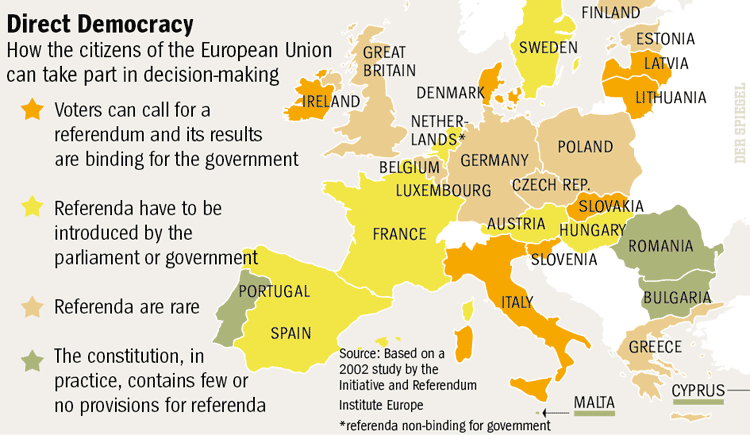
Courtesy of Der Spiegel
Back Next


 Calendar
Calendar




